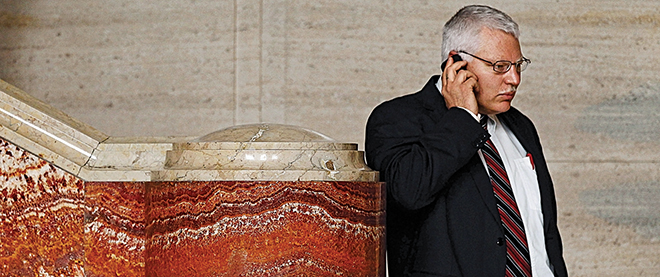Flaky limits on free speech
In its ruling on human rights commissions, at least the Supreme Court made the rules clearer
Chris Wattie/Reuters
Share

Free-speech advocates have been waxing wroth all week over the Supreme Court’s long-awaited ruling in the case of Bill Whatcott, an itinerant street-corner politician who fancies himself a one-man crusade against the gay conspiracy to infiltrate schools, media and Old-Testament-God-knows-what. University of Saskatchewan law professor Michael Plaxton took to the Globe and Mail to accuse the court of “all but strangling” some kinds of religious speech, and the paper’s editorial voice, cranky “Junius,” called the unanimous decision “too vague.” Andrew Coyne’s analysis for Postmedia was punctuated with exclamations like, “I cannot quite believe I am reading these words.” Religious and conservative bloggers even spoke of “the death of free speech in Canada.”
The ruling was appalling in a number of ways, most notably in its dismissal of any possibility of a truth defence against human rights commissions who hunt “hate speech.” The court specifically insists that true statements arranged in certain ways can be officially “hateful,” conceding a total lack of interest in truth and basically handing its banner over to the commissions’ targets. For liberals who share the goals of these commissions, this is a moral disaster that can only multiply Bill Whatcotts ad infinitum. People of the Whatcott type already believe themselves to be in special possession of suppressed facts, and now the court has said explicitly that spreading falsehoods is no part of their offence.
But since we columnists are in the business of telling truth, whatever a court thinks, it ought to be admitted that, dead or alive, free speech in Canada was never in such good shape. The Supreme Court’s decision is an elaborate partial rescue of standing precedent; the constitutionality of hate policing by provincial commissions was established many years ago, and the unpleasant surprise is only that it wasn’t killed on this occasion.
Chief Justice Beverley McLachlin has a history of favouring tough First Amendment-style protections for speech, and the panel contained two Stephen Harper appointees who might have been expected to augment that position. Instead, the decision embodied a flaky, outmoded “balancing” act of the sort familiar from earlier jurisprudence. Bill Whatcott has a right to make loopy flyers with “Born gay? No way!” scrawled on them and gay Canadians apparently have a right for those flyers not to exist, since they are hateful.
This is actually an irreconcilable contradiction, but the court did its best to handle it. It pointed out that the Saskatchewan Human Rights Commission’s powers have been circumscribed by statute so that there is no possibility of someone like Whatcott being jailed for refusing to co-operate with the negotiation/re-education process contemplated under the law. Some of the fines against him were upheld by the Supreme Court and he can still be jailed for defying the order to pay, but those fines, the court helpfully explains, are “compensatory, not punitive.”
One sees what fine jokes result when the state tries to make one plus one equal fried chicken. But as a practical matter, Whatcott probably need not pay. If Saskatchewan attempts to imprison him for Christian tract-making, the free-speech chorus already so evident as a consequence of these cases will instantly become international, grow loud enough to deafen and invite widespread disobedience and protest within the province itself. Without doubt, many gays and lesbians who respect classical liberal principles would join. (Those guys love a chorus!)
Meanwhile, the Supreme Court decision did actually grant Whatcott partial victory, finding that the Saskatchewan human rights statute was unconstitutionally broad in application. The decision states that the law can only be engaged by pure speech under very specific circumstances, and emphasizes that it is not enough to ridicule, demean, or offend a protected group. Satire and parody, however crude, emerge from the Whatcott ruling with superior legal armour. From now on, the only lawfully valid subject of human-rights commission attention is “delegitimizing” speech that characterizes a group as subhuman or specially menacing. And the court provides a useful list of identifying markers for such speech, though one doubts it will prove exhaustive.
For those of us who make a living in creative or intellectual expression, it is worth something to have the laws limiting it defined as clearly as possible while being compacted into a minimum volume. The Supreme Court has made the rules clearer, and this is not to be sneered at, even if its logic sometimes is—especially since the overall authority of human rights commissions has undergone net diminution in the process. It is just possible the chief justice wasn’t entirely asleep at the switch.
On the web: For more Colby Cosh, visit his blog at macleans.ca/colbycosh